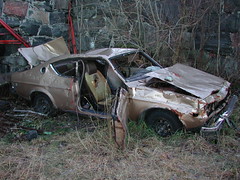Publishing this post scares me, because the subject is so personal. I'm going ahead with it anyway with the hope that I can get across my meaning. Deep breath.
From my first attempt at writing in second grade, I began my journey making up fantasy stories. Many long-time readers will know that those early plots were largely inspired by Beverly Cleary and her mouse Ralph, resulting in several stories involving rodents.
Even in high school, when I co-wrote an entire novel with a friend, it was a re-telling of a fairy tale (this was waaaay before doing that was cool or commonplace).
The first novel I tried my hand at by myself as an adult: also a fantasy.
So it came as a surprise to me when I began getting ideas for books with a specifically Mormon angle to them. Of course, those ideas turned into the books that got published.
I did two contemporary novels that you could call romance, and I generally do, but I've never been entirely happy with that label. Not because I don't like romance; I absolutely do, as evidenced by THIS and THIS and the fact that we're doing more of Timeless Romance Anthologies and having a ball with it. Not to mention that I went on to do historical LDS novels, and every single one of them has a romantic element.
But those first two books especially had something else in them too, something I couldn't put my finger on, but which made me hesitant to classify them strictly as romances.
So there was Lost Without You, and then At the Water's Edge (although they were written in the opposite order). Then came the four historicals: House on the Hill, At the Journey's End, Spires of Stone, and Tower of Strength. Each of my historicals, with the exception of Spires, which is a romantic comedy in spite of the serious-looking cover, had that same "other" quality.
Then I was told not to write any more historicals. And I wondered what in the world I'd do next. I'd already started researching my next one, and I had to set it aside and find something else to write about.
Enter my childhood friend Chris and her husband's deployment, which in a roundabout way led to me deciding that I had to write about what it's like to be home with a soldier gone and in the line of fire. In categorizing that book, romance never entered my mind, because, well, it's totally not. Band of Sisters is clearly women's fiction.
Some people think romance and women's fiction are the same thing, but they're not. Not even remotely. Women's fiction doesn't have a love story as the primary arc, and it deals with issues and conflicts that wouldn't normally appear in a romance. I loved writing that book, and it even took the Whitney Award in its category that year.
Yet I still thought that one day, I'd return to my fantasy roots and write books for kids. That feeling was strengthened by the fact that here in Utah, we have more successful writers of youth fiction than probably any other state in the nation. Tons of New York Times bestsellers, a Newbery honoree, and more. Youth writers here are rock stars. It's the market and genre that are most respected in these parts, likely because Utah has a lot of kids, families are serious about literacy, and we tend to like clean books, which often means youth fiction. Take this piece in the news, for example. (In case you don't click over: a launch party for Brandon Mull with Tyler Whitesides, Richard Paul Evans, Chad Morris, and Christopher Paolini. NOT KIDDING.)
Then I had a good chunk of my critique group also writing youth fiction, and this one and this one have had significant success with it (young adult and middle grade, respectively) on the national stage.
Yet I also loved mysteries, and I had a bunch of cool ideas for some. I loved romance, and could see myself writing that. I loved historicals, and would be happy doing more. And so on. What on earth should I focus on?!
My publisher couldn't/wouldn't give me direction on what they wanted next besides no more historicals even after I handed over a list of ideas and asked which they'd be most interested in.
I floundered like a boat without a rudder. I had a total and utter writer identity crisis that lasted two and a half miserable years.
The go-to advice for this kind of situation is to write the kind of book you like to read. Problem: I read all kinds of books, and I enjoy just about every genre. So that suggestion was no help.
Then one year for NaNoWriMo, I decided to write something totally wacky and weird and fun to shake myself out of the awful funk I was in. I drafted 50,000 words of a futuristic, science fiction-type young adult story. And it was a lot of fun. But contrary to my hopes going in, the experience didn't make my future writing path any clearer. (And no, that book will never see the light of day.)
Yet I knew I needed a clear path, something to sink my teeth into and identify as my own. I needed a map to plan my writing future.
I ended up deciding to write the sequel to Band of Sisters even though I had no assurance that my publisher would take it. They did (yay!), and Coming Home was released in January.
During the last year or so, a few things happened to cement my writer identity. One was researching and writing Coming Home. Another was being part of The Newport Ladies Book Club series with my novel Paige and the forthcoming Ilana.
And then during the 2012 LTUE conference, Luisa and I went out to dinner to brainstorm. She knew of my identity crisis and suggested we hash it out over food. I brought along a notebook with ideas that included young adult fantasy, historical, romance, and everything in between. We picked a story with a really cool premise, and by the time we paid our tabs, we had a rough plot sketched out.
In writing that book, which I'll begin major revisions on soon, I finally came to realize that this was the genre I belonged in. It was women's fiction. And women's fiction is my home.
I realized that my first two books were women's fiction in disguise. That was the element I could never quite wrap up tidily in the romance bow. Women's issues popped up in my historicals too.
While I was thrilled to finally latch on to my writer identity, it came with a price. Remember, I live in the land where writers of youth fiction are rock stars and are most respected by colleagues. Even my own daughter recently asked if I could please write a cool book like the fantasy we were reading together, and it broke my heart to say that I'm writing for grown-ups.
Then there are those packed, celebrity-style launch parties like the one I linked to above. It seems that most writer events for fans tends to lean more toward youth fiction as well. There was one a few years ago that included my friend Janette Rallison (who writes YA), and at the same event was Scott Westerfeld and Stephenie Meyer, among others. Really.
I've had to come to terms with the side of my ego that would like acclaim. The reality is that if I become very successful with women's fiction, it will be with limitations. In some ways, I'd like my youngest to look at me like her hero, but that can't happen if I'm not writing kids' fantasy books. Which I'm not.
Plus, youth fiction has a crossover readership from kids to grandparents, while women's fiction is read almost entirely by, well, adult women. So the numbers are different: simply put, the sales potential for youth fiction is much greater. Unless someone waves a magic wand and I become the next Jodi Piccoult, I won't be getting rich writing women's fiction. (I wouldn't mind becoming the next Kristen Hannah, though... Seriously. Her interview in Writer's Digest pretty much blew my socks off and confirmed my writer identity.)
While I'm not greedy, I am a professional, and I do rely on the money I make through my writing. Making a conscious choice to essentially limit my potential income was hard.
I also had to choose to basically walk away from earning the respect of certain peers who almost look at youth fiction as the one and only true market. Would I like my ego to be stroked a bit? Sure. Could I write youth fiction? Sure. I love the genre, and I've developed the chops over the gazillion years I've been writing to do it.
But when push comes to shove, I believe that I'm supposed to be writing women's fiction now. When I look at my list of story and research ideas, it's all women's fiction now.
I've wondered why, and why now. Why didn't I figure this out 18 years ago when I first started submitting? There may be several reasons, but I think a major one is the fact that while youth fiction isn't any easier to write than grown-up fiction (they're both hard to do well, and anyone who tells you differently is lying), in order to write good women's fiction, I simply had to be older. I had to experience more, see more of the world, encounter more situations, gain more maturity. On the other side, I've already been an adolescent. As long as I can write well and tap into that part of my brain, I could write youth fiction.
But I couldn't have written good women's fiction at 21, because back then I was barely a woman.
A bit of irony: Turns out that the old piece of advice was right after all. While I do read all kinds of books and love almost all genres, if I had to list my top books of all time, most of them are, yep, women's fiction.
Tuesday, March 19, 2013
Wednesday, March 06, 2013
WNW: Hypercorrection
On our last Word Nerd Wednesday, we talked about how Utahns say mountain and how some people over overboard in trying to be "right" (note the sneer quotes) by pronouncing the T. When my friend Jordan McCollum, who is as big a word nerd as I am (only more qualified, because she's got a degree in linguistics), commented in that post about hypercorrection, I knew I wanted her to elaborate on the topic and share it with my readers.
Don't know what hypercorrection is? Don't think you're guilty of it? Maybe, maybe not. It's worth knowing about. Read on!
Hypercorrection: If talking like this is wrong, I don't want to be right
Guest post by Jordan McCollum
Have you ever drifted out of your lane while driving? I know I have. The natural tendency is to quickly correct your course by pulling the wheel back the opposite way. But sometimes, a drifting driver jerks the wheel back in the right direction too much. The over-correction succeeds, but the vehicle shoots into the wrong lane or the car rolls.
The same thing happens in language. (Okay, with fewer fatalities.) Most people want to speak "correctly." But did you know there might be such a thing as "too right"? I'm sure we've all had an English teacher or other "friend" who corrects casual speech with prescriptivist usage and pronunciation.
Fortunately, sometimes, those friends are so right, they're wrong. (But not dead. Whew!)
Hypercorrection
Hypercorrection is the linguistic term for being "too right." Usually, hypercorrection comes about because the speaker knows the "rules" of the language, in pronunciation, usage, or grammar, but applies them in more situations than they should (hence clip at right).Hypercorrection is a very common phenomenon. In fact, it's part of learning a language, too. If you've ever heard a small child suddenly start saying "goed" instead of "went," it's a form of hypercorrection. They're learning that you form the past tense by adding the -ed sound, and applying it in situations where you actually don't follow that rule.
Hypercorrection in pronunciation
A couple weeks ago, Annette blogged about how people pronounce "mountain." People see the T and believe that they pronounce it like you'd say a T in isolation, or at the beginning of a word. However, the American pronunciation of "mountain" uses a glottal stop instead of a "tuh" (and those are just two of the six ways T is pronounced in English words!).Mountain isn't the only word that uses a glottal stop for a T. Most speakers of American English, in natural speech, will pronounce the first T in important as a glottal stop. (It shows up all over the place in lots of other varieties of English too, so no knocking on Americans.)
However, some American English speakers see the "T" and think the "correct" pronunciation must feature a hard "tuh" sound like you'd hear from a T at the beginning of a word (or in British English). But T is virtually never pronounced as "tuh" in the middle of a word in American English—we rely on four of the other "allophones" of T in the middle of words, and the glottal stop is just as valid a rendition of T as the "tuh." So when you stick a "tuh" in the middle of "important," you start to sound a little . . . well, self-importuhant.
Phonologically speaking, this pronunciation is unnatural in all varieties of English (because in British English there's no 'r' there).
Another great example of hypercorrection is found in this clip from My Fair Lady, where Professor Higgins is trying to teach Eliza Doolittle to stop her dropping her H's at the beginning of words:
The "hever" is exactly the same principle—applying a correct rule (add an 'h' to the beginning of words that you pronounce as starting with a vowel) to an incorrect situation (a word that really does start with a vowel). Funnily enough, this same principle has changed the pronunciation of the name of the letter "h" in some varieties of English to "haitch." This is also influenced by the perception of h-dropping accents like Cockney as lower in prestige.
Another place I see this is when actors who speak a variety of British English get an American role. In many accents of British English, an R at the end of the syllable isn't pronounced, but in most varieties of American English, it is. So sometimes an actorrr tries a little too harrrd to stick those R's in therrre, verging on another popular dialect, Pirate English. Yarrr. (But yay for trying!)
Hypercorrection in grammar
The same principle applies to grammar (maybe even more so). For example, most speakers of English are taught from a young age that you shouldn't say "me" in subject position: Never "me and you went to the store." (Don't you just cringe?!) Always "You and I gave her the gift." But when we move the "me" into another position in a sentence, things get a little trickier: "She gave the gift back to you and I."If you're not cringing again, here's a hint: it's "me" there. She gave the gift back to me / She gave the gift back to you and me. (Or if you're really having trouble, "She gave the gift back to us"!)
Eventually, some people try so hard to speak "correctly" that they end up talking like this:
For our one year anniversary, my girlfriend caused myself to go to a Yankees game, with whomever amongst our friends can go. But, the Weather Channel just changed their forecast and the skies are grey, so we might go with the girl that lives next door to see the movie, "Iron Man 2".I—just—I—oh, where to begin?
We all want to talk correctly. But keep in mind that hypercorrection isn't "extra right." It's actually wrong.
What do you think? What are your favorite examples of hypercorrection? How do you see good grammar principles go bad?
An award-winning author, Jordan McCollum blogs about writing craft and the writing life at JordanMcCollum.com. She holds a degree in American Studies and Linguistics from Brigham Young University and now makes her home in Utah with her husband and three children. Catch up with her writing links, word nerdiness and crazy life on Twitter, @JordanMcCollum.
Subscribe to:
Comments (Atom)
BOOKLOVER DEALS FOR PRIME DAY!
Amazon's famous Prime Day events are huge for so many reasons, and for bookworms, it's even better: books aren't high-ticket ite...

-
Yay! From today, November 17, through Sunday, November 27th, I'm part of the Gratitude Giveaway Hop! It's a chance for me to say th...
-
As part of the celebration for the release of my book Tower of Strength, I'm doing a giveaway that will last through Saturday, with win...
-
Self-editing must be in the water . . . last week I posted on the Precision Editing Group blog about how I do it , answering questions from...




